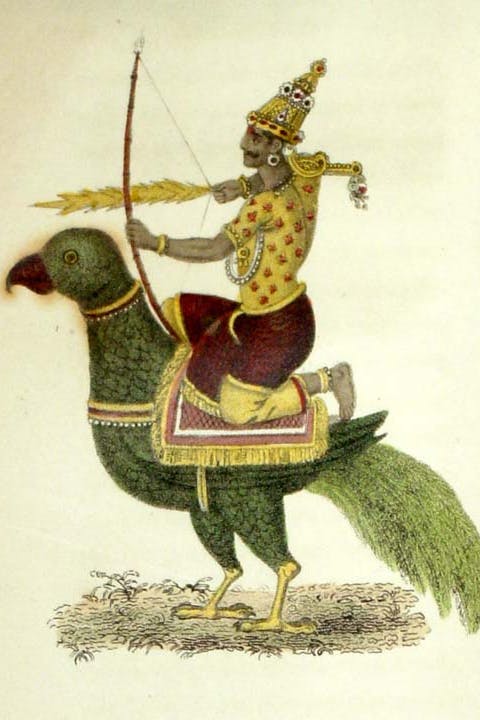Kamadeva

Kāmadeva or Kama is the Hindu god of human love or desire, often portrayed along with his female counterpart Rati. Some narratives also reference Pradyumna, Krishna's son, as a reincarnation of Kamadeva.
The name Kama-deva can be translated as 'god of love'. Deva means heavenly or divine. Kama means "desire" or "longing", especially as in sensual or sexual love. The name is used in Rig Veda (RV 9, 113. 11). Kamadeva is a name of Vishnu in Vishnu Purana and Bhagavata Purana (SB 5.18.15), and of Krishna as well as Shiva. Kama is also a name used for Agni (Atharva Veda 6.36.3).
Other names used in reference to Kamadeva are Manmatha/Manmathudu (one who agitates), Atanu (one without a body), Ragavrinta (stalk of passion), Ananga (incorporeal), Kandarpa (inflamer even of a god), Madana(intoxicating), "Manmatha" मन्मथ (churner of hearts), Manasija he who is born of mind, a contraction of the Sanskrit phrase Sah Manasah jāta), Ratikānta (lord of Rati), Pushpavān, Pushpadhanva, Kusumashara कुसुमशर (one with arrow of flowers), Abhipura (also a name for both Shiva and Vishnu), and simply Kāma (desire, longing).
Kāmadeva is represented as a young, handsome man with green skin who wields a bow and arrows. His bow is made of sugarcane with a string of honeybees, and his arrows are decorated with five kinds of fragrant flowers. The five flowers are Ashoka tree flowers, white and blue lotus flowers, Mallika plant (Jasmine) and Mango tree flowers. A terracotta murti of Kamadeva of great antiquity is housed in the Mathura Museum, UP, India.
Some of the attributes of Kamadeva are: his companions are a cuckoo, a parrot, humming bees, the season of spring, and the gentle breeze. All these are symbols of spring season, when his festival is celebrated as Holi, Holika or Vasanta.